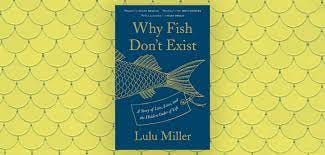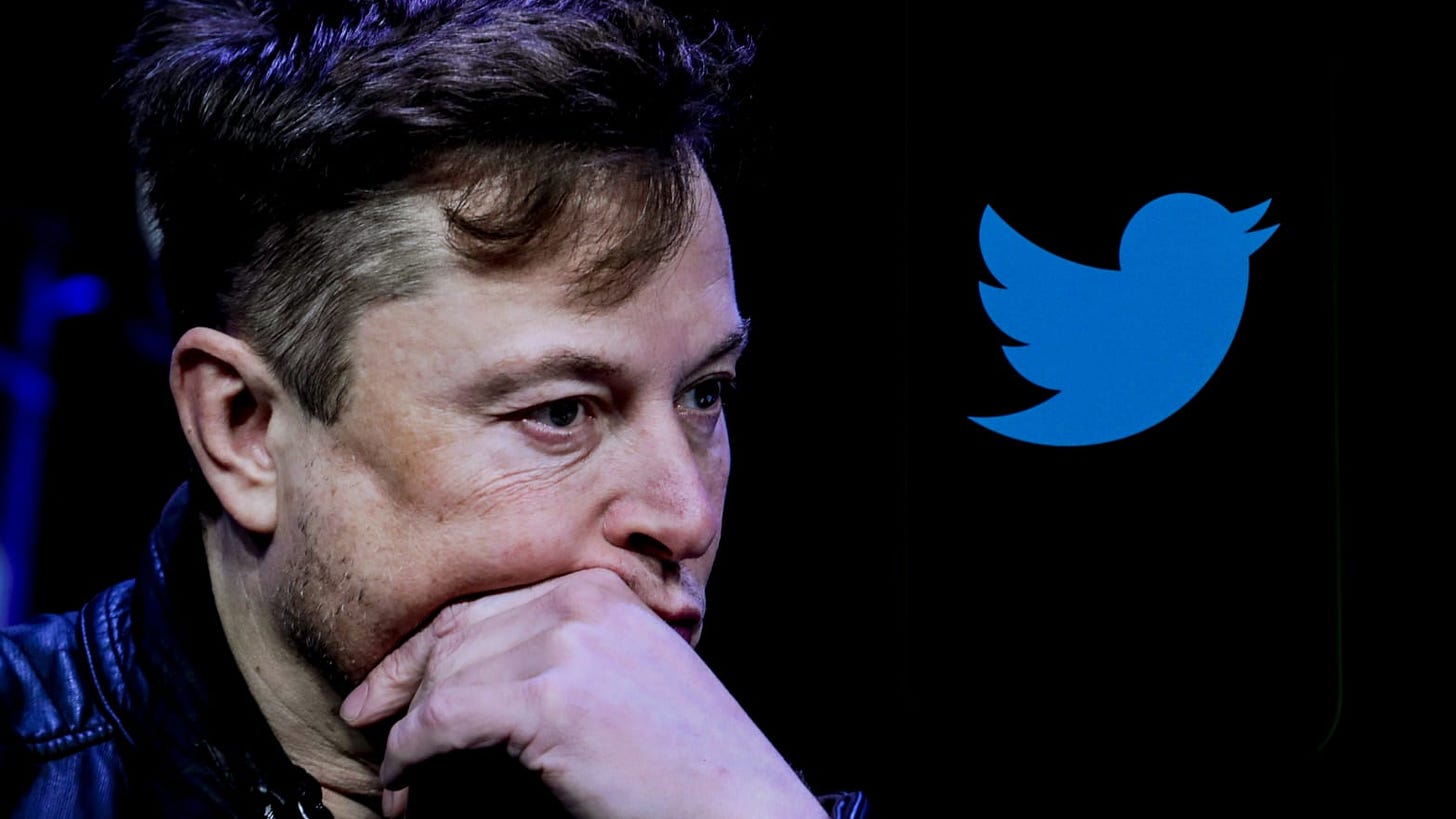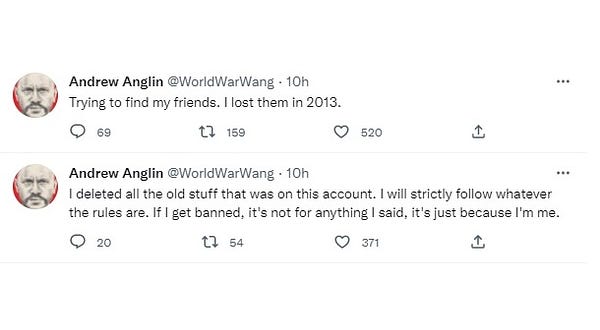One night, I ended up in a Guadalajara brothel by accident. You'd be surprised what that has to do with Twitter.
Elon Musk is lighting $30 billion on fire because he doesn't see he's holding a flamethrower.
Sorry I didn’t write last week. Had a lot going on, most of which I’ll fill you in about later. One big thing was that my friend died. Jo Carol Pierce, whom I profiled in Texas Monthly in 2015 as the best Texas songwriter you’ve never heard of, passed away due to lung cancer.
When I thought about starting this newsletter, I called her for permission. Who was I to share my thoughts with the world? But if Jo Carol thought it was a good idea… And she did. Below is a poem she wrote that her daughter and my good friend Elyse gave me permission to publish.
SEER
by Jo Carol Pierce
I love a path One day I found one a deer path through the grass the wine cups and the daisies
it led to a grove of creek trees hiding a lake glittering in the sun.
I waded its inlets and outlets I trampled its banks I sat just inside its glitter. I let tadpoles swim through my fingers I saw the sunfish jump the ripples spread just beyond my feet
I found my grassy path again and let the wind dry my muddy behind I picket a bouquet and left it on my hot car seat as my life settled back around my shoulders like a caul.
Next day I brought Ellery, a 10 year old adventurer. She wore boots carried a stick
She ran down the path then stopped and drew breath at the glitter of the water and waited for me.
She pointed her stick at the water. Not going. “I see five water moccasins and those are just the ones on the surface.”
There they were brown on brown hiding in the shallows patrolling the center shadowing an inlet.
I counted them lying in wait where I had sat and tramped blinded by glitter and tadpoles.
Take a dog said Ellery. Wear your boots carry a stick and bring me until you learn to see.
I’ve been puzzling over why Elon Musk, who by credible accounts is a smart fella and who has built two of the most iconic, innovative companies ever, is apparently content to light $30 billion on fire. That’s how much he personally spent to buy Twitter, which has chased away so many large advertisers that Professor Scott Galloway estimates that “Elon — in less than a month — has turned a $5 billion business into a $1.5 billion business.” And how was your November?
To call Twitter a dumpster fire maligns both dumpsters and alleys. A dumpster contains fire; Twitter spreads it across the business and culture pages and into the White House where spokesperson Karine Jean-Pierre said they’re “certainly keeping an eye on" how Twitter handles misinformation and hate speech. We’re consuming the Twitter saga as an entertainment, political, and cultural moment, forgetting perhaps that we’re witnessing an inarguably successful businessperson destroy one of the most influential social media companies. Elon is not nearly as dumb as he’s acting, and yet.
In thinking this through, I was reminded of the time I ended up in a brothel in Guadalajara where I was visiting with my friends Alex, who was born and raised there, and Tim, who didn’t speak a lick of Spanish and had only a bit more sense than that. We were at a nightclub with Alex’s cousin, who didn’t speak much English, so when we started talking about where we were headed next, the exchange devolved. Only the most essential words were tossed over the language barrier.
“Food,” said Alex.
His cousin responded with a different f-word.
“Fud,” he said.
Back and forth it went to snorts and shouts until we settled on the amalgamation of “fud,” a bastardization that represented less of a consensus than a concession to get his cousin out of there so we could get some tacos. We piled into his black SUV, and off into the night we went, stopping on a quiet street in an upscale, established residential neighborhood outside of a white row house.
“Restaurant?” I asked the cousin, pointing at the building.
“Fud,” he said.
Reasonable doubt did not survive entry into the building. Several young women wearing unmentionables and expectant expressions were sitting around a table. As soon as Tim and I entered, they stood in unison. It would have been rude to just walk off and leave them there. I am, if nothing else, a gentleman. Tim, however, didn’t notice them and went right up the spiral staircase and disappeared down a hallway.
Alex and his cousin came in next, and immediately Alex began redirecting his cousin from making acquaintances, which meant that I, who at the time spoke barely a word of Spanish, was tasked with retrieving Tim. Maybe a minute had passed since we’d walked in, which if you know Tim, is way too much time for him to be unsupervised in a brothel. I was counting on Tim not speaking Spanish to impede his ability to engage in any business transactions, but the evening was quickly turning into an X-rated Yakkity Sax.
So there I was, wandering the empty halls of a house of ill fame, calling out, “Tim!” A note on the interior: In contrast to the townhouse’s curb appeal, the floor I was on looked like temporary construction. There was nothing recalling the aesthetic traditions of bordellos. Nary a swatch of red velvet was to be found, nor a painting of a nekkid lady in repose, just nondescript carpet and drywall painted white. I felt like I was walking down a hallway in a shared workspace, which I suppose I was.
Eventually Tim came bounding down the hall with a huge, proud smile on his face.
“Hey, where is everyone?” he asked. “I got us a table!”
It’s not that Tim was a prude or ill-equipped to recognize the signs of sex work. But he came expecting to see a restaurant. Therefore, he saw a restaurant.
By the way, did you know there is no such thing as fish?
Let me back up, in her bestselling Why Fish Don’t Exist, Lulu Miller points out the word “order” first “describe[d] a row of threads sitting neatly in a loom. In time, it was extended as a metaphor to describe the way that people sit neatly under the rule of a king, general, or president. It was only applied to nature in the 1700s under the assumption—a human fabrication, a superimposition, a guess—that there is an orderly set of ranks to find there.”
Early taxonomists believed that there was a moral aspect to the “natural order of things,” and that humans were at the top of the ladder because they were the most moral.
It was the belief that there is a ladder built into nature. A Scala Naurae. A divine hierarchy from bacteria to humans that points objectively toward better.
In fact, they thought if a species was especially shiftless that they could devolve into a mollusk or some especially stationary thing. And because they expected to see the natural world fit into their preconceived notions of grades of superiority, they got caught up in the appearance of things. Never mind that the lungfish has more in common with a cow than with a tunafish. (It’s the lungs, yo.) “Fish, as a legitimate category of creature, do not exist,” writes Miller. This has been a real bummer for ichthyologists since this became known in the 1980s.
You dive into the ocean expecting to see fish, they will all look like fish instead of an unimaginably varied world. You go into a brothel expecting to get fed, you’re going to get shown a table and handed a takeout menu.
Now, to the bird app:
Musk bought Twitter because he thought he could solve its problem, but he didn’t see the problems that ordinary business analysts did. Galloway, for one, thought it ludicrous that brands and celebrities could broadcast to millions of followers for free. And he thought, perhaps counterintuitively, that speech on Twitter should be more moderated, not less.
Not Musk. He thought Twitter’s business problem was censorship, namely, that it was suppressing conservative opinions despite Twitter’s own research (which it published in 2021) that found its algorithm actually did the opposite, according to The Guardian.
The research found that in six out of seven countries, apart from Germany, tweets from rightwing politicians received more amplification from the algorithm than those from the left; right-leaning news organisations were more amplified than those on the left; and generally politicians’ tweets were more amplified by an algorithmic timeline than by the chronological timeline.
According to a 27-page research document, Twitter found a “statistically significant difference favouring the political right wing” in all the countries except Germany.
But in Musk’s bubble, conservatives who violated Twitter’s terms of service in terms of hate speech weren’t being kicked off, they were being censored. As Galloway observes, Musk was falling victim to his perspective, seeing things his way and believing that his way was reality.
Listing only the (anecdotal) evidence favoring their view and declaring “a pattern has emerged” while ignoring contrary evidence and science. Elon draped himself in right-wing credibility on this issue over the past year, pandering to the right’s baseless, subjective victimhood with promises to restore “free speech.” The right confirms this, acting as if letting the Babylon Bee back on Twitter makes you John Stuart Mill.
Musk figured if he granted “amnesty” to banned Twitter accounts, including Andrew Anglin, the neo-Nazi editor of The Daily Stormer, that revenues would rise. Instead, hate speech rose, and advertisers fled.
And then we have the Twitter Files. Musk thought everyone would see what he saw, that is, a corporation censoring conservative speech. Instead, what impartial observers saw was content moderators wrestling with whether a news article based on stolen information (see also: purloined pictures of Hunter Biden’s pee pee, among other things) violated their terms of service. Musk thought he saw a fish; ‘twas but a nothingburger.
I sympathize with Musk, who is empirically wrong about what ails Twitter. He is just a human. He’s a smart man with, like all of us, a dumb brain with, Miller writes, a “kind of an order-creating mechanism inside of us — that we come into the world predisposed to acquire a very specific set of beliefs about how to sort nature.” This faulty hardwiring in our brains probably accounts for our susceptibility to biases. To see things as they are and not according to our beliefs (as Jo Carol wrote, “to learn to see”) is perhaps a uniquely human problem.
When you and I let our beliefs get in the way of seeing the world, we sheepishly walk out of brothels and go get tacos. But when Musk does it, he immolates corporations. Musk is going to shed billions until he either loses his illusions or control of Twitter. On a bigger scale, this is the struggle we all have: to see things as they are without imposing our beliefs on them. Our brains might be horribly dumb, but they can learn to see.
Jason Stanford is the co-author of NYT-best selling Forget the Alamo: The Rise and Fall of an American Myth. His bylines have appeared in the Washington Post, Time, and Texas Monthly, among others. Follow him on Twitter @JasStanford.
Thanks to Noom, I lost 40 pounds over 2020-21 and have kept it off since then. Click on the blue box to get 20% off. Seriously, this works. No, this isn’t an ad. Yes, I really lost all that weight with Noom.
We set up a merch table in the back where you can get T-shirts, coffee mugs, and even tote bags now. Show the world that you’re part of The Experiment.
We’ve also got a tip jar, and I promise to waste every cent you give me on having fun, because writing this newsletter for you is some
Buy the book Texas Lt. Gov. Dan Patrick banned from the Bullock Texas History Museum: Forget the Alamo: The Rise and Fall of the American Myth by Bryan Burrough, Chris Tomlinson, and myself is out from Penguin Random House. Out in paperback now!








